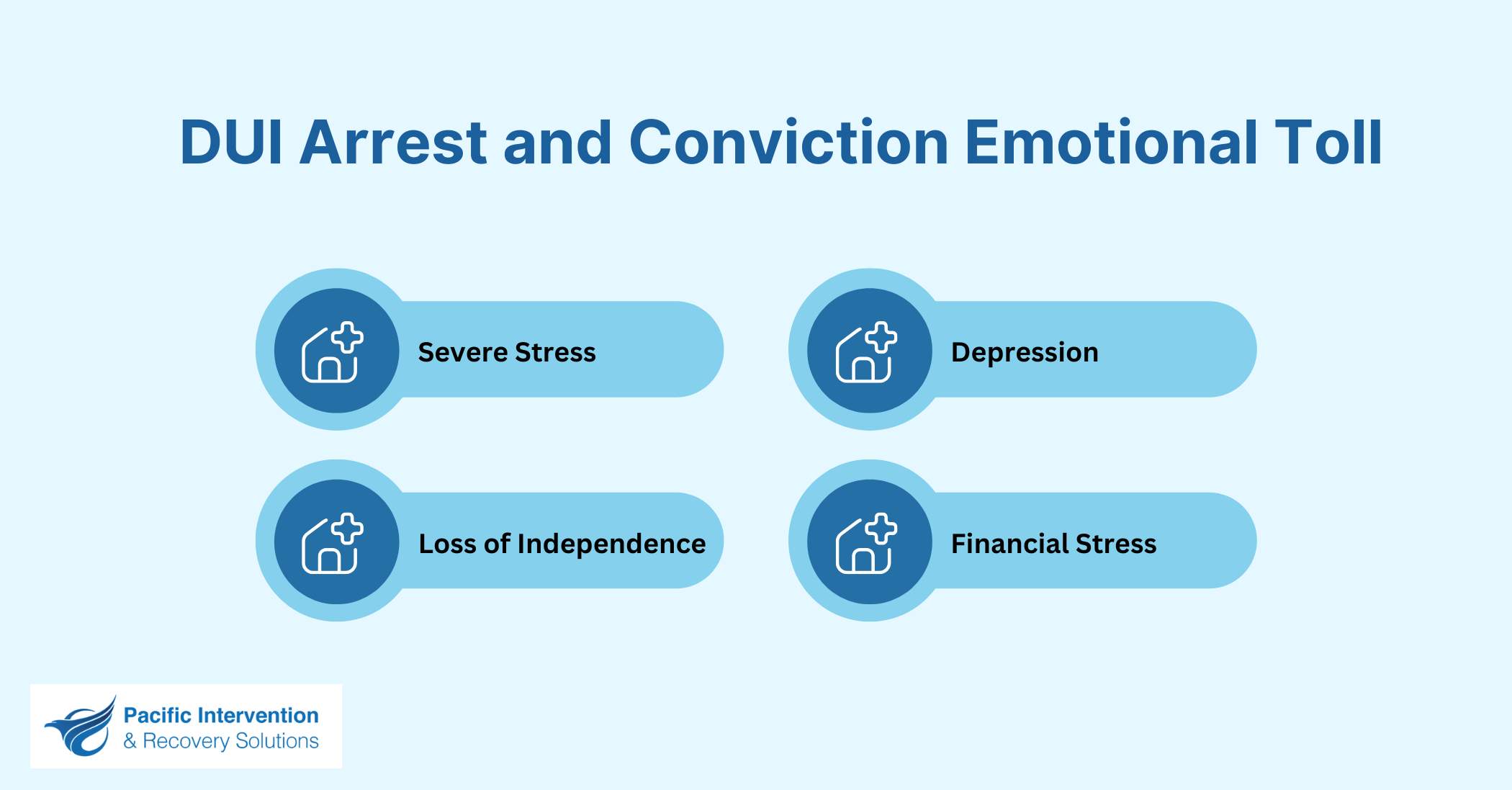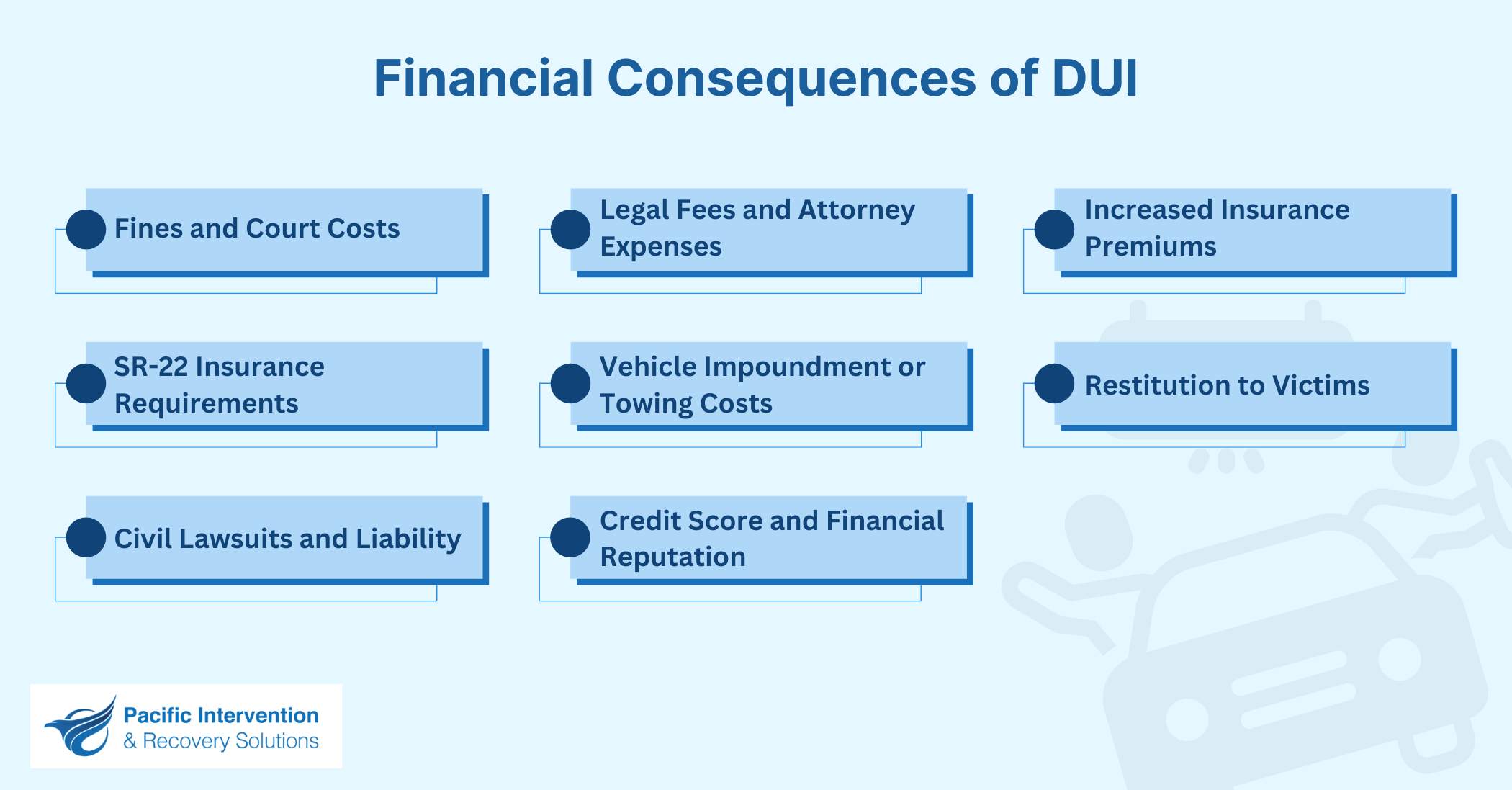Every day, countless lives are impacted by the devastating consequences of driving under the influence (DUI). In Canada, impaired driving remains a leading cause of preventable accidents and fatalities.
Statistics reveal that nearly 30% of fatal collisions involve alcohol or drugs, underscoring the widespread risks of impaired driving. Beyond the immediate dangers, DUI leads to serious legal, emotional, and financial challenges for individuals, families, and communities. Yet, many people underestimate these risks or believe they are immune to such consequences.
At Pacific Interventions, we are committed to changing this narrative. By raising awareness of the dangers of impaired driving and equipping individuals with practical prevention tools, we aim to create a safer, healthier future for everyone.

What does DUI mean in Canada?
In Canada, Driving Under the Influence (DUI) refers to operating a vehicle while impaired by alcohol, drugs, or a combination of both. Impairment can range from mild to severe, but any level that compromises safe driving can result in a DUI charge.
The law applies to all substances that impair driving, including prescription drugs, illegal drugs, and over-the-counter medications. The focus in DUI cases is on impairment itself, regardless of the type or amount of substance consumed.
Many drivers are unaware that even small amounts of alcohol or certain medications can significantly impact their ability to drive and lead to serious legal consequences.
Types of DUI in Canada
- Alcohol Impairment
- Drinking alcohol remains the most common cause of DUI. The legal limit for blood alcohol concentration (BAC) is 0.08.
- Drug Impairment
- This includes impairment from illegal drugs, prescription medications, over-the-counter drugs, and cannabis—all of which can negatively affect driving ability.
- Combination of Alcohol and Drugs
- Drivers impaired by both alcohol and drugs face DUI charges, often with heightened penalties.
- Low-Level Impairment
- Even with a BAC below 0.08, visible signs of impairment can still result in DUI charges.
- Prescription Medications
- Legal prescriptions can lead to a DUI if they impair a driver’s coordination, reaction time, or judgment.
- Zero Tolerance for New Drivers
- Strict rules apply to new or young drivers in certain regions. Any detectable level of alcohol or drugs can result in a DUI charge for these individuals.
Legal Implications of DUI in Canada
A DUI charge in Canada carries significant legal consequences that can impact your life both immediately and in the long term. The severity of these consequences depends on factors such as the level of impairment and whether the incident caused harm to others. Understanding these implications underscores the importance of making responsible choices when driving.
Key legal consequences of a DUI include:
- Criminal Charges: A DUI is a criminal offence in Canada, and a conviction can result in a permanent criminal record.
- Driver’s License Suspension or Revocation: DUI charges often lead to the suspension or permanent revocation of your driving privileges, making daily life more challenging.
- Fines, Driving Bans, and Jail Time: Penalties for DUI range from fines and driving bans to incarceration, particularly in cases involving severe impairment or harm to others.
- Harsher Penalties for Repeat Offences: Multiple DUI offences lead to escalating penalties, including longer license suspensions, larger fines, and mandatory jail sentences.
- Insurance Consequences: A DUI conviction significantly raises your insurance premiums and may result in loss of coverage, making it more complex and more expensive to get insured.
- International Travel Restrictions: Certain DUI convictions can limit your ability to travel to countries with strict entry requirements, such as the United States.

Why is DUI dangerous?
Driving under the influence (DUI) is among the most reckless decisions a person can make, with far-reaching consequences that extend beyond the driver. Impaired driving endangers passengers, other road users, and entire communities, often resulting in devastating consequences. Recognizing these risks is essential for preventing DUI and its consequences.
Key reasons to never drink and drive include:
Poor Judgment & Memory Loss
Alcohol impairs rational thinking, leading to poor decision-making and a loss of inhibitions. This compromises your ability to assess risks and make safe driving choices.
Impaired Coordination
Even low levels of Blood Alcohol Content (BAC) disrupt motor skills, affecting hand-eye coordination needed for vehicle control. This significantly increases the likelihood of accidents.
Slower Reactions
Impaired drivers experience delayed response times to hazards, such as sudden stops or pedestrians crossing the road, making collisions harder to avoid.
Increased Risk of Severe Accidents
DUI dramatically raises the chances of fatal crashes. Statistics show that every two minutes, someone is injured by an intoxicated driver.
Legal Consequences
Driving under the influence can lead to criminal charges, hefty fines, lawsuits, and even jail time. These repercussions include harming others, including passengers, pedestrians, and other drivers.
The Safety Risks of DUI
Alcohol and drugs significantly impair critical driving skills, such as depth perception, reaction time, alertness, and motor function. DUI accidents often result in life-altering injuries, including:
- Traumatic Brain Injuries
- Spinal Cord Damage
- Permanent Disabilities
Impaired driving remains one of the leading causes of road deaths in Canada. By understanding these dangers, we can work toward making safer choices and reducing DUI-related tragedies.
Tips for Avoiding DUI
Avoiding DUI requires planning and recognizing when you’re not fit to drive. Here are practical steps to ensure you and others stay safe:
1. Plan to Prevent DUI
- Designate a Sober Driver: Assign someone to stay alcohol-free for the event.
- Use Rideshare Services or Taxis: Opt for options like Uber, Lyft, or a local taxi.
- Stay Overnight: Consider staying at a friend’s house or venue after drinking.
- Use Public Transit: If available, take public transportation to avoid driving while impaired.
- Stop Drinking Early: Finish drinking at least 90 minutes before planning to leave.
2. Recognize When You’re Unfit to Drive
The most crucial step in DUI prevention is identifying when you’re impaired. Alcohol and drugs impair judgment and reaction time, often without immediate awareness. Look for these warning signs:
- Slurred Speech: Difficulty forming clear sentences.
- Blurred Vision: Trouble focusing or double vision.
- Impaired Coordination: Stumbling, swaying, or difficulty maintaining balance.
- Lack of Concentration: Struggling with simple tasks or instructions.
- Extreme Fatigue: Feeling drowsy or unable to stay alert.
3. Choose Safe Alternatives
If you’re unable to drive, always prioritize safety by choosing one of these options:
- Call a rideshare or taxi.
- Ask a friend or family member for a ride.
- Stay where you are until you’re sober.
DUI Arrest and Conviction Emotional Toll
A DUI arrest not only leads to legal consequences but also creates significant emotional challenges. The aftermath can profoundly impact mental health, daily life, and financial well-being, leaving individuals to navigate a range of difficulties:

Severe Stress
A DUI arrest often leads to overwhelming stress, as individuals worry about the legal process and its consequences. This stress is compounded by the need to maintain daily responsibilities, such as working, meeting deadlines, and paying bills, all while managing the uncertainty of the case. Many imagine worst-case scenarios, which only makes it harder to cope with the situation.
Depression
DUI charges can result in significant emotional distress. The loss of independence, financial strain, and social stigma often lead to feelings of sadness or shame. Individuals may isolate themselves from family and friends due to embarrassment, creating a lack of support that makes it challenging to overcome these negative emotions and move forward.
Loss of Independence
The suspension of a driver’s license can feel like a loss of freedom, especially for those who rely on driving to commute to work or perform daily tasks. This restriction can negatively impact mental health, leading to feelings of entrapment and frustration as basic activities like grocery shopping or attending appointments become challenging.
Financial Stress
The financial burden of a DUI conviction can be immense, often resulting in depression or anxiety. Between fines, attorney fees, court costs, and mandatory programs, expenses can range from $4,000 to $17,000. Even individuals with stable incomes may find themselves financially strained, further adding to the emotional toll.
Financial Consequences of DUI
A DUI conviction can result in severe financial burdens that affect multiple aspects of life. From fines to increased insurance costs, the expenses add up quickly, underscoring the importance of responsible decisions:

Fines and Court Costs
DUI fines and court costs vary based on location and offense details. Convicted individuals can face thousands in fees, including mandatory lab tests and penalties from agencies like the DMV for license suspension.
Legal Fees and Attorney Expenses
Hiring an attorney for DUI charges is costly, especially for complex cases. Legal fees typically cover court filings and may include expenses for expert witnesses, adding significant financial strain.
Increased Insurance Premiums
A DUI conviction marks drivers as high-risk, leading to substantial hikes in insurance premiums. Some may even lose coverage entirely, further complicating transportation options and finances.
SR-22 Insurance Requirements
After a DUI, many drivers are required to carry an SR-22 insurance policy to demonstrate financial responsibility. This often comes with significantly higher premiums and additional compliance costs.
Vehicle Impoundment or Towing Costs
When vehicles are impounded after a DUI, daily storage fees and towing charges can quickly accumulate. Administrative costs and potential damages during impoundment further increase the financial burden.
Restitution to Victims
DUI offenders may be required to pay restitution to victims for expenses such as medical bills, property damage, or emotional trauma. Community service or educational penalties may also be mandated to demonstrate accountability.
Civil Lawsuits and Liability
DUI-related incidents often lead to civil lawsuits for personal injuries or wrongful death. Offenders may face claims for medical expenses, lost wages, and damages, which can significantly impact their financial stability.
Credit Score and Financial Reputation
Unpaid fines, legal penalties, and higher insurance rates can harm credit scores and financial reputations. This can limit access to loans, housing, and other economic opportunities, creating long-term challenges.
Conclusion
Driving under the influence (DUI) is a critical issue that endangers everyone on the road. The legal, financial, and emotional consequences are significant, but DUI is entirely preventable with the proper precautions. By planning, recognizing signs of impairment, and opting for safer alternatives such as designated drivers, rideshare services, or public transit, you can protect yourself and others from harm.
If you or someone you know is struggling with alcohol or drug use, support is within reach. Pacific Interventions offers tailored counseling and treatment programs, including outpatient services, family interventions, and recovery coaching, designed to meet individual needs.
Don’t wait for a tragic event to make a change. Take the first step today. Visit Pacific Interventions to learn how we can help you or a loved one reclaim a safer, healthier life. Your well-being and safety are our priority—contact us for a consultation today.



